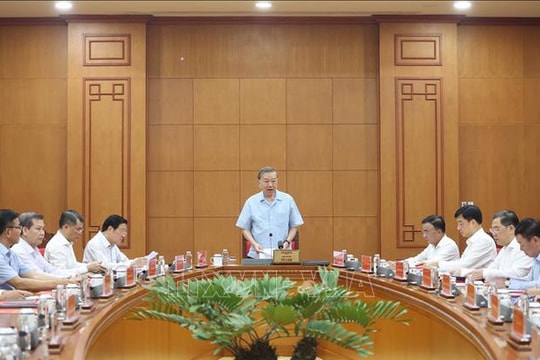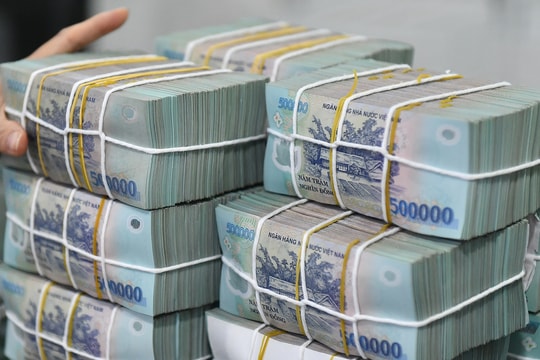What to do to make people believe in the success of the fight against corruption?
“An atmosphere of excitement is spreading throughout society. That is a real and legitimate sentiment, it is what makes us happy, it is our support, and we are expected to do even better.”
Chairing the 16th meeting of the Central Steering Committee on Anti-Corruption recently, General Secretary and President Nguyen Phu Trong, Head of the Steering Committee, affirmed that “an atmosphere of excitement is spreading throughout society”. Every time the Inspection Committee meets or the court announces something, public opinion is very interested. People always look forward, even somewhat worried: “Can it be maintained, can it continue to be strong or will it slow down?”. That is a real and legitimate mentality, that is what makes us happy, that is our support, and that we want to do it even stronger.
The comments of the General Secretary and President are very accurate. The people are very excited and confident in the fight against corruption, the "furnace" campaign. Every time more corrupt officials are "put in the furnace", the people of the whole country become more excited and confident. That psychological state is inevitable because:
The country’s assets, which ultimately belong to the people, are being plundered, exploited, and divided. While the people are struggling with countless difficulties to make a living, “a large number” of officials live in luxury, from one mansion to another; competing to send their children to study abroad in rich capitalist countries…
When those who are entrusted with power by the people and paid salaries to work with the political system to lead the country to the goal of a rich people, a strong country, a democratic, fair, and civilized society, this "not small part" finds every way to exploit the people and the country, contributing to making the country fall behind and making society deeply unjust.
And these corrupt officials, before being unmasked, preached morality everywhere, opposing tyranny, bureaucracy, being distant from the people, being indifferent and insensitive to the difficulties and frustrations of the people; resolutely fighting against corruption and waste; fighting against degradation and decline in moral qualities.
I sympathize with the people's psychological state, but if you think about it, seeing one generation of cadres after another being imprisoned is also a common pain because of the loss of cadres and the erosion of trust.
 |
| People are very excited and confident in the fight against corruption and the "furnace burning" campaign. Photo: Le Anh Dung |
Since the beginning of the term, more than 70 cadres and party members under the management of the Politburo and Secretariat have been subject to party discipline and criminal proceedings. The inspection and audit agencies have recommended the recovery and handling of 61,392 billion VND and 142 hectares of land; recommended administrative disciplinary action against 692 groups and many individuals; and transferred 46 cases and 73 subjects to the investigation agency for consideration and handling. The Government Inspectorate has focused on inspecting and issuing inspection conclusions on projects and cases according to the plan of the Steering Committee.
Among the thousands of officials who were “put in the oven”, there were nearly hundreds of high-ranking officials. Among them were Politburo members, Deputy Prime Ministers, many Central Committee members, Ministers, nearly 30 military and police generals…
Why is it that the “furnace” has been hot for years, but when one layer of “wood” is put into the “furnace”, another layer of “wood” appears? Could it be due to the following basic reasons:
The first:The process of selecting officials is said to be very elaborate and strict, but it seems that there are still too many loopholes, so many opportunists still sneak into the state apparatus and political system to make profits. Even many officials who violate discipline and seriously violate the law still climb high.
Monday:Few countries in the world have a system of political and administrative schools as large as in Vietnam, where cadres must undergo training programs in politics and state management before being appointed to higher positions. Is it possible that the motivation and awareness of many cadres to study in specialized fields are not appropriate, not for the purpose of honing knowledge, political qualities, state management capacity, ethics and qualities?
Tuesday:Is it true that the supervisory role of the National Assembly, the judiciary, the People's Councils and the Fatherland Front over the executive branch and the political system at all levels is still inadequate? Is that why the role in detecting and preventing violations by officials in the executive branch and the political system is still limited?
For example, a series of serious violations in land transfers in Da Nang, Nha Trang, Ho Chi Minh City... led to serious economic, political and social consequences; people have been complaining and crying for more than 20 years.
Wednesday:Is it true that the inspection, examination and audit work at all levels is not yet resolute, still ignoring violations, and rarely detecting corruption? Meanwhile, most corruption cases are discovered by the people or by internal denunciations, or exposed by the press.
Thursday:The role of state management in state management agencies related to the economy and state-owned enterprises is still inadequate and lax. This is the fertile ground for corruption to develop. That is why there are so many corrupt leaders in state management agencies in the economic sector and state-owned enterprises.
In 2014, Mr. Phan Dang Tuat, when he was Chairman of the Board of Directors of Saigon Beer Alcohol & Beverage Corporation (Sabeco), warned: "Conflicts in state-owned enterprises will never end. If Vinashin and Vinalines are equitized soon, state management will be less difficult. If equitization is not accelerated, I am afraid that in the next few years, many of you here (attending the Conference) will have to "go" again."
As Mr. Phan Dang Tuat predicted, since then many people, in serious cases, have become suspects, defendants, and prisoners; in light cases, they have been disciplined and lost their jobs.
Sixth: According to the Political Report of the 12th Party Congress, “political innovation is not synchronized with economic innovation”. Will this lead to inadequacies in economic management institutions and mechanisms; an unsynchronized, overlapping, and loophole-ridden legal system, causing one generation of cadres to “fall into the trap”?
On the other hand, when the economy is still being interfered with and does not operate according to its own laws, the situation of asking and giving is still common, creating fertile ground for officials to collude and embezzle assets?
General Secretary Nguyen Phu Trong has outlined the reasons why corruption has not been prevented: “Institutions and legal policies in some areas are still inadequate and not highly feasible; there is no strong enough mechanism to strictly control power; the work of inspecting and supervising the exercise of power by people with positions and powers has not been given due attention, so it is easy to lead to abuse of power for personal gain…”
Therefore, in order for people to have confidence in the success of the fight against corruption, and for this fight to be victorious and bring long-term effectiveness, it is necessary to link economic reform with institutional reform, national governance reform; and to link economic development with building a rule-of-law state.
These are the most effective solutions to pave the way for a smooth market economy and are also the most effective solutions to promote the role of mutual control and supervision of legislative, judicial and executive agencies in the state apparatus.
Vietnam is a transitional economy, still lagging behind in many aspects, so it needs to consult and absorb the quintessence of developed countries in managing a market economy and building a rule-of-law state.






.jpg)

